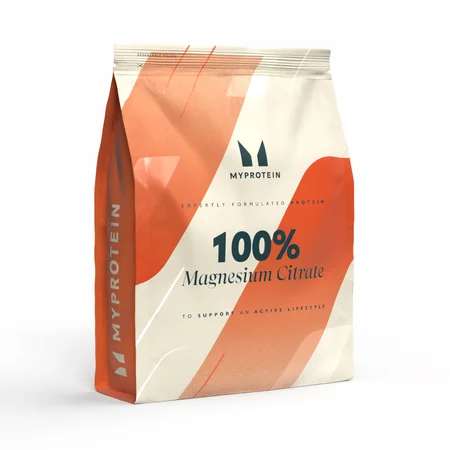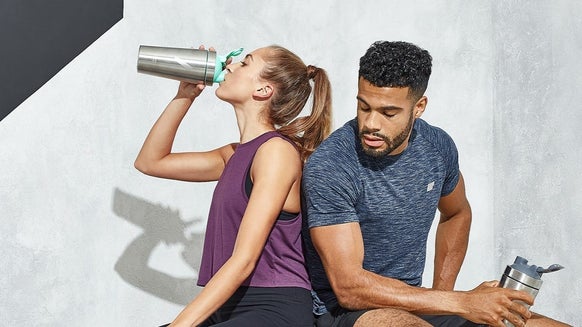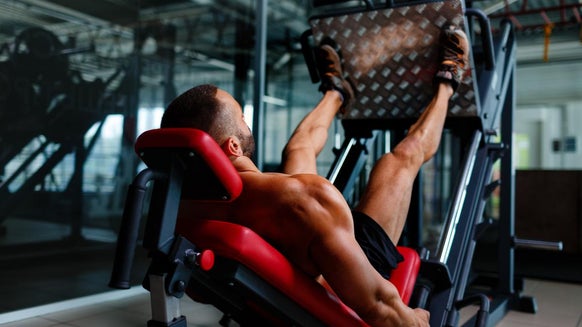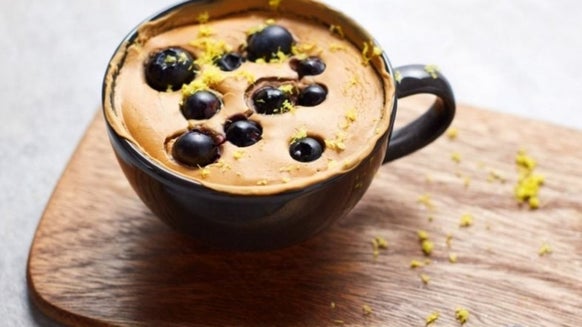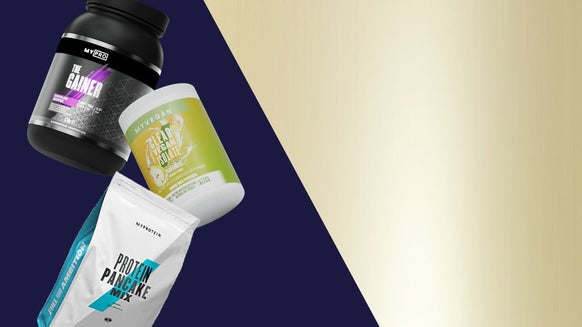10 Supplements To Help Fight Tiredness and Fatigue

Experiencing chronic tiredness or fatigue can impact your daily life and the quality of your workouts, leading you to look into supplements for tiredness. When it comes to supplements, there are a lot on the market than can help provide an extra boost of energy for our bodies to function better. Some supplements for tiredness are quick acting and others have a long-term impact.
The supplements for tiredness discussed below range from basic B vitamins that you can get from your diet, to ancient herbs and common minerals. Some of these supplements might be part of a daily multivitamin or pre-workout blend, and others you might take on their own. Regardless, if you’re suffering from occasional or even chronic tiredness and fatigue, these supplements might be just want you need to start feeling your best. Read on to decide which fatigue-fighting supplements might be right for you.
In this article, you'll find:
B12
Iron
Vitamin C
Folic acid
Magnesium
Caffeine
Ginseng
Creatine
Green tea
Coenzyme Q10
What causes tiredness and fatigue?

10 supplements and vitamins for tiredness and fatigue
1. B12
Vitamin B12, also known as cobalamin, plays a crucial role in cellular function and energy metabolism. You have to get it from your diet (or as a supplement), because your body can’t manufacture it on its own.1
B12 usually comes from animal foods in our diet (meat, poultry, etc.) and is often low in vegetarians, vegans, the elderly, and anyone with malabsorption problems. Vitamin B12 deficiency can lead to a condition called megaloblastic anaemia, making you feel tired and weak.2
Evidence shows a significant increase in energy when those who are B12 deficient increase their B12 levels through supplementation.2
2. Iron
Another type of anaemia that can leave you feeling tired and weak is iron-deficiency anaemia. It’s one of the most common nutritional deficiencies in the world.3 This occurs when low levels of iron in your blood prevent your cells and tissues from getting enough oxygen, leading to chronic fatigue and tiredness.3
Iron is found in many animal foods such as red meat, but also in spinach, legumes, and some seeds. Iron supplements can cause some side effects, so it is best to have your levels checked and speak with your doctor about a course of treatment if you suspect you are iron-deficient.
3. Vitamin C
Vitamin C, also known as ascorbic acid, is another common vitamin that comes in many foods we consume (like citrus fruits) but some of us don’t get enough on a regular basis. It’s common knowledge that vitamin C can help boost the immune system and shorten the duration and severity of the common cold, making us feel better and more energetic faster.4
Along these same lines, vitamin C may help boost the immune system and prevent the fatigue associated with common illnesses.4 Vitamin C is also crucial in helping our body absorb the iron from foods to help prevent iron-deficiency anaemia.
If someone is deficient in vitamin C, both their iron absorption (which is crucial for energy) and their health can suffer. Additional studies are finding a relationship between vitamin C and reducing delayed-onset muscle soreness (DOMS), which can increase performance and energy levels after a tough workout.5

4. Folic Acid
Just like B12, you must get B9 from your diet. Folic acid is found in leafy greens, whole grains, and citrus fruits, but these foods alone are sometimes not enough to meet your daily needs. Long term deficiency can lead to confusion as well as physical fatigue since folate plays a role in cellular energy production, so if you can’t get enough from your diet, then a supplement may be a good option.6
5. Magnesium
Magnesium is a mineral (like sodium or calcium) that plays a role in a lot of cellular level functions, especially the work of our nerves and muscles.7 It is essential in helping to free the energy from the food we eat, optimising the digestion and absorption of our food.
It also plays a role in oxygen uptake by our muscles, which becomes crucial during exercise, especially aerobic activity.7 For this reason, low levels of this mineral have shown a decrease in performance and energy during workouts. However, fatigue from insufficient magnesium was shown to improve with supplementation, leading to greater strength and performance.8
6. Caffeine
Caffeine may be the first compound you think of when you need an energy boost. It’s found in so many common beverages – coffee, tea, soft drinks, energy drinks, and energy supplements. It’s the most consumed stimulant in the world.9 Research shows that up to 400mg of caffeine per day shows no negative effects in healthy adults.10
Caffeine improves energy, focus, and concentration, making it a common ingredient in pre-workout supplements. Remember, caffeine is a fast-acting, temporary energy booster. You can also feel withdrawal symptoms if you miss coffee in the morning once your body is accustomed to a daily dose.
Another concern with caffeine is the extra sugar and calories that often come with it in energy drinks and sugary coffee beverages. Check the other ingredients in your caffeine sources to make sure they won’t drag you down with extra sugar.

7. Ginseng
Ginseng is well known as a nootropic (believed to enhance congitive functions) supplement with brain-boosting properties. It has been used as a medicinal herb for thousands of years for many reasons, but most often for a mental energy boost.
8. Creatine
Creatine is a common ingredient in workout supplements due to its ability to help increase your energy for improvements in endurance and strength.12 It’s effective for a wide range of energy needs – high intensity interval training, weight lifting, and even endurance sports like running or swimming.12
Creatine has been well researched and proven effective in boosting energy levels with sufficient muscle stores – making daily supplementation common.12 Since many of the dietary sources of creatine are animal based, vegetarians and vegans in particular can find help decreasing fatigue with a creatine supplement.12
9. Green Tea
Green tea is another common supplement for fighting fatigue. It has been used daily for years in many cultures around the world and, like caffeine, acts as a quick stimulant. Although green tea leaves have several components, most research is related to its effects coming from the amino acid l-theanine.
L-theanine has shown improvements in brain function, overall metabolism, and high anti-oxidant effects.13 While L-theanine is shown to play a major role in the energy boost from green tea, using green tea leaves or matcha powder (a concentrated powdered form) in beverages or other foods may have even more benefits from the combination of all of the bioactive components.
10. CoQ10
CoQ10, short for coenzyme Q10, is a crucial factor in cellular energy production and is a powerful antioxidant.14 It’s found in all of our cells, but in higher concentrations in our brains, heart, and kidneys. CoQ10 is made by our bodies but decreases as we age, which may lead to a need for supplementation.
Inadequate amounts of CoQ10 limit the cells’ ability to divide and perform their functions, which can lead to fatigue in the long term. A deficiency has been shown to be linked to some chronic diseases, but there are no safety concerns with daily supplementation.14 Generally, CoQ10 is one supplement that’s more useful as you age to help us feeling great and performing at our best.
What causes tiredness and fatigue?
Do you feel run down and exhausted all the time? There are many reasons why you might not have enough energy for your workouts, or even just to get through the day. Are you eating a balanced diet, exercising regularly, sleeping well, and drinking enough water?
You might even be overtraining and overworking your body without ample recovery time. Some days it’s hard to find the perfect balance of food, exercise and sleep when we have so many other demands to meet.
Take home message
These 10 supplements for tiredness can help boost your daily energy levels and fight fatigue in different ways. Based on your age, diet, and exercise habits some may be more effective for you than others.
Caffeine and green tea are easy to find in any coffee shop, while iron, vitamin B12 and folate come in many food sources and most multivitamins. Creatine is common in pre-workout supplements or on its own.
Consider all of the potential ways these powerful supplements can help you meet your goals of greater energy and less fatigue.
Why not take a look at our Energy Tablets?

Claire is a Registered Dietitian through the Academy of Nutrition and Dietetics and a board-certified Health and Wellness Coach through the International Consortium for Health and Wellness Coaching. She has a Bachelor of Science in Biology and a Master’s degree in Clinical Dietetics and Nutrition from the University of Pittsburgh.
Talking and writing about food and fitness is at the heart of Claire’s ethos as she loves to use her experience to help others meet their health and wellness goals.
Claire is also a certified indoor cycling instructor and loves the mental and physical boost she gets from regular runs and yoga classes. When she’s not keeping fit herself, she’s cheering on her hometown’s sports teams in Pittsburgh, or cooking for her family in the kitchen.
Find out more about Claire’s experience here.


